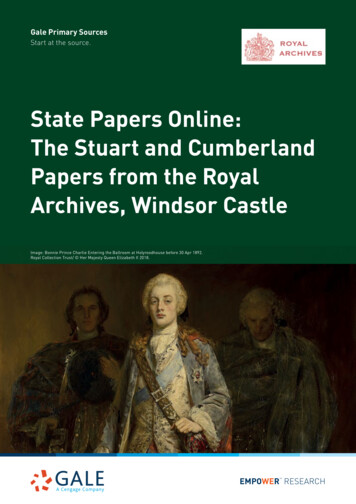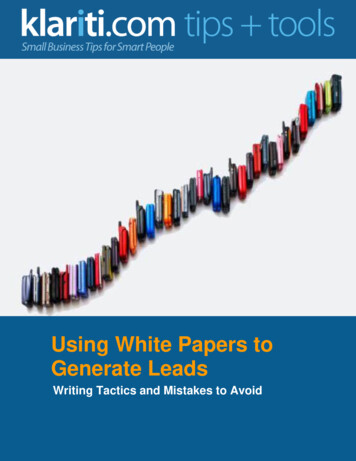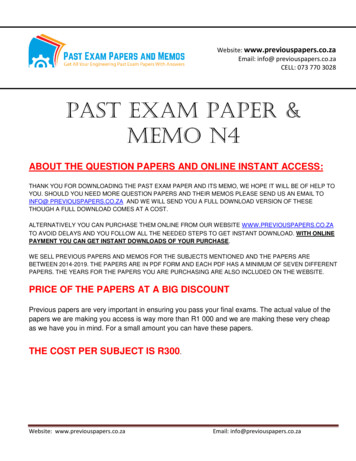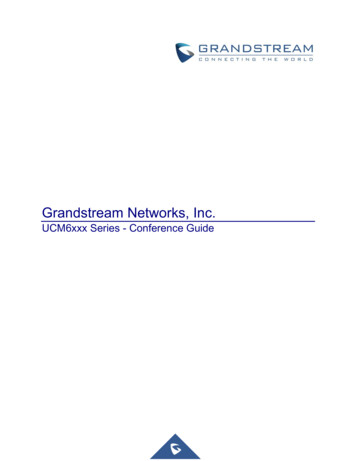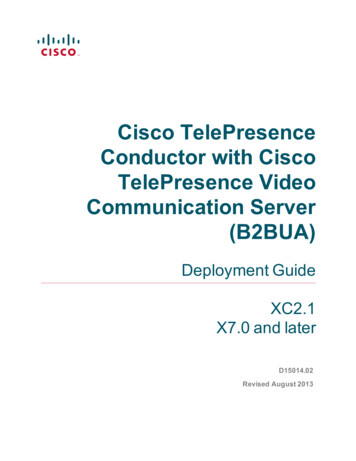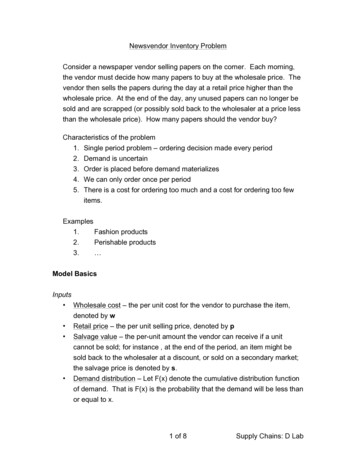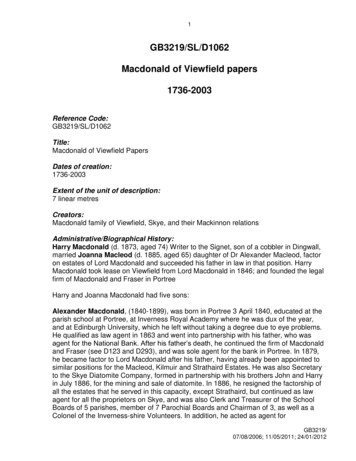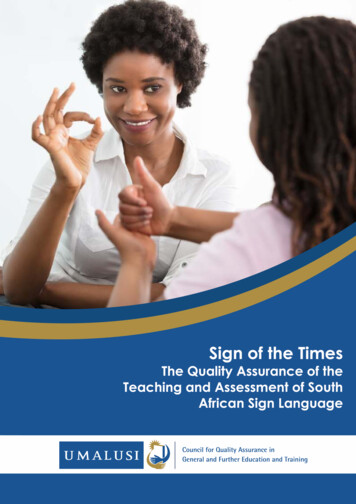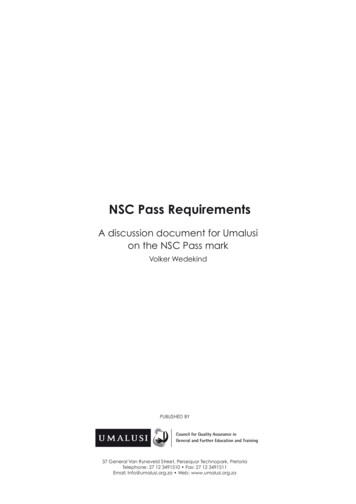
Transcription
Conference Papers4th Sub-Regional Conference on Assessment in EducationHosted by UmalusiAt the of University of Johannesburg, School of Tourism and Hospitality26th to 30th June 2006i
AcknowledgementsUmalusi would like to thank our printers, Idube Security Printers, for generously coveringthe cost of printing this book, as well as conference t-shirts, invitations to conference events,and conference certificates of attendance.Our other generous sponsors are listed on the insert, and we would like to express ourextreme gratitude to all of them.Umalusi would also like to express its gratitude to Shireen Badat and Matseleng Allais, fortheir energy, vision, determination, sense of humour, attention to detail, creativity, andceaseless hard work, in preparing for this conference. They were assisted by RamadimetjaPhaladi, Frank Chinyamakobvu, and Eugene du Plooy in the build up to the conference, andwe would also like to thank them for their hard work and dedication.ii
Table of contentsAcknowledgements .IITable of contents .1Introduction .3Programme .5Keynote address: Making our own modernity: standards, values, andbenchmarks in the African school in the age of globalization: CrainSoudien.9Accountability and support in school development in South Africa: NickTaylor .21MSCE examination results—Are they a reliable tool for measuringeducational standards? David Yadidi .37Parity of esteem: hope or despair? Ronel Blom .49Can we ensure that vocational programmes are at the same ‘standard’ asgeneral education programmes? Gerald Chiunda .65Apples and oranges? Comparing vocational and general subjects: StephanieMatseleng Allais.73Determining standards in practical subjects: Betty Mutambanengwe .85Assessing the proficiency of adult learners in reading literacy in SouthAfrica: Surette van Staden and Sarah Howie .95Diffusion of the National Qualifications Framework and outcomes-basededucation in Southern and Eastern Africa: Linda Chisholm .111Standards based educational reform and its implications on school-basedassessment: Francis Chirume.127A recognition of outcomes-based assessment practices from a Foucauldianperspective: Cindy Ramhurry.139‘Indigenous knowledge’, assessment, and international standards: KaiHorsthemke .1511
Ethnobased learning and international standards in assessment: ToliweChehore .161Locating the local village within the global village: assessment possibilitiesand practical challenges: Vanessa Scherman, Elizabeth Archer, andSarah Howie .173International assessment standards versus local curriculum objectives:Ngoato Takalo .195Constructing an integrated model for the quality assurance of school-basedassessment in preparation for the National Senior Certificate:Rufus Poliah .199Towards piloting school based continuous assessment at middle basic level:The Zambian approach: Newton Mutanekelwa and GabrielMweemba.215The fallacy of measuring mathematics ‘competencies’ in a context of a ‘highstakes’ external examination: Thabiso Nyabanyaba.221Determining standards—moderation of marking with specific reference toexternal moderation performed by Umalusi: Prince Masilo .241Using the internet to monitor the moderation of school based assessment(SBA): Clive Long .247Remarking of examination answer scripts—finding a standard for qualityassurance: Joe Cesare and Coert Loock .263Looking for a needle in a haystack: establishing ‘standards’ at the end ofGET (grade 9): Anne Oberholzer .277“A tail of many dogs”: Assessment and the scramble for standards: SandileNdaba .289Standards—a couple of steps back: Mark Potterton.295Determining educational standards in Malawi: Duncan Nyirenda .305‘Getting it right, keeping it right’: Rosalynd Janisch.313Strategies for answering multiple choice questions among South Africanlearners: Edith Dempster .323How are teachers’ understandings and practices positioned in discourses ofassessment? Anitha Ramsuran .337Lessons learnt from the evaluation of examination systems for the SeniorCertificate: Chris Nyangintsimbi .347Does quality assurance improve the quality of education?: Peliwe Lolwana.3532
IntroductionUmalusi is very proud to host the 4th Annual Sub-Regional Conference on Assessment inEducation. Since the first conference took place four years ago in Zambia, the conferencehas proved to be an extremely useful forum for Examinations Councils and otherorganizations involved in educational assessment in Southern African countries to shareideas, best practice, challenges, and solutions. We hope this conference will continue thisemerging tradition, and consolidate a stronger working relationship between the countriespresent.The theme of the 2006 conference is Assessment and Educational Standards. Umalusi felt thatthis was an appropriate theme given the international increasing concern about ‘standards’.There is ongoing public debate about educational standards being too high or too low, andassessment and quality assurance bodies are confronted with criticism from the public if passmarks go up or down. But what is meant by standards? How are they determined? Whoplays a role in determining them? What is the role of assessment? How does it relate to thenew standards-based educational reform movement, and outcomes-based education, if at all?How should the standard of African education systems relate to international standards?‘Standards’ is a crucial, but difficult issue for assessment bodies. We felt that the time is rightto share ideas about how some of these issues have been tackled in our different systems.This conference is an opportunity for members of examinations boards in SADC countriesto share research, systems, approaches, and ideas about standards, systems of standardssetting and monitoring, and systems to ensure that educational programmes are relevant andappropriate. The conference has various sub-themes, which explore the notion of standardsin different ways:- Thinking about standards over time, across subjects, and across learning pathways- Standards-based and outcomes-based educational reform- Determining standards- Measuring learner performance against standards- International standards and local knowledge.As can be seen from this conference package, we have received a range of excellent papersaddressing these themes, from nearly all countries in the Southern African sub-region. Thisbook contains all except three papers that will be presented at the conference, and we hopethat it is useful to delegates, as they listen to papers being presented, but that it also enablesthem to share the conference papers with others in their organizations, who did not manageto attend the conference.3
4
ProgrammeJUNE 25TH (SUNDAY)Reception for delegates at 6pm, at Milpark Garden Court. Registration for SADC delegates and out-of-townSouth African delegates from 6-7 at the Milpark Garden Court Hotel.DAY ONE: JUNE 26TH (MONDAY)TimeSessionSpeakers07:30Registration and tea09:00Opening sessionOpening: Dr Peliwe Lolwana, UmalusiChair: South AfricaGreeting: Dr Ihron Rensburg, University of JohannesburgGreeting and handover of chairpersonship to South Africa:MW Matemba, Malawi National Examinations BoardInvocationKeynote address: Prof Crain Soudien, University of CapeTown: Making our own modernity: standards, values, andbenchmarks in the African school in the age ofglobalization11:30Tea12:00Thinking about standards overtime, across subjects, andacross learning pathwaysChair: Swaziland13:0013:30Group photographLunch14:30Thinking about standards overtime, across subjects, andacross learning pathwaysChair: Tanzania5Dr Nick Taylor, Joint Education Trust: Accountability andsupport in school development in South AfricaMr David Yadidi, Malawi National Examinations Board:MSCE Examination results—Are they a reliable tool formeasuring educational standards?Ms Ronel Blom, SAQA: Parity of esteem betweenvocational and general educationMr Gerald Chiunda, Malawi National Examinations Board:Can we ensure that vocational programmes are at thesame ‘standard’ as general education programmes?Thecase of Geometrical and Orthographic Drawing in MalawiCraft
TimeSession16:00Tea16:30Thinking about standards overtime, across subjects, andacross learning pathwaysMs Betty Mutambanengwe, Zimbabwe SchoolExaminations Council: Determining standards in practicalsubjectsChair: MozambiqueMs Surette van Staden and Prof Sarah Howie, Universityof Pretoria: Assessing the proficiency of adult learners inreading literacy in South Africa18:00SpeakersMs Matseleng Allais, Umalusi: Apples and oranges:comparing vocational and general subjectsCocktail party and finger supper with the Minister of Education at the University ofJohannesburg, School of Hospitality and TourismDAY TWO: JUNE 27TH (TUESDAY)TimeSessionSpeakers08:30Standards-based andoutcomes-based educationalreformMr Joe Samuels, SAQA: SADC Joint model for assessmentand certificationChair: BotswanaProf Linda Chisholm, Human Sciences Research Council:Diffusion of NQF and OBE in SADCMr Francis Chirume, Zimbabwe School ExaminationsCouncil: Standards-based educational reform andimplications for school-based assessmentMs Cindy Ramhurry, University of Johannesburg: Arecognition of assessment practices in South Africa from aFoucauldian perspective10:30Tea11:00International standards and localknowledgeDr Kai Horsthemke, Wits University: ‘Indigenous knowledge’,assessment and international standardsChair: ZambiaMr Toliwe Chehore, Zimbabwe School Examinations Council:Ethno-based learning and international standardsMs Vanessa Scherman, Ms Elizabeth Archer, and Prof SarahHowie, University of Pretoria: Locating the local village withinthe global village: assessment possibilities and practicalchallengesDr NgoatoTakalo, North West University: Internationalstandards versus local curriculum objectives13:00Lunch14:00Assessing learners against6Mr Rufus Poliah, South African National Department ofEducation: Constructing an integrated model for the quality
TimeSessionstandardsSpeakersassurance of school-based assessment in preparation for theNational Senior CertificateChair: ZimbabweMr Newton Mutanekelwa and Mr Gabriel Mweemba,Examinations Council of Zambia: Towards piloting schoolbased continuous assessment at middle basic level: TheZambian approachDr Thabiso Nyabanyaba, Wits Education Policy Unit: Thefallacy of measuring mathematics ‘competencies’ in a contextof ‘high stakes’ examinationsMr Prince Masilo, Umalusi: Determining standards—moderation of marking with specific reference to externalmoderation performed by Umalusi16:0016:3018:00TeaDetermining standards/Assessing learners againststandardsDr Morgan Naidoo, KZN Department of Education:Adjustment of marks and the uses of norms and standards inthe Senior Certificate examinationChair: LesothoMr Clive Long, IEB: Using the internet to monitor themoderation of School Based Assessment (SBA) as a firststep to innovation of SBADinner and evening activityDinner at Moyo, Market Theatre. Buses depart fromUniversity of Johannesburg, School of Hospitality andTourism.DAY THREE: JUNE 28TH (WEDNESDAY)Time08:3018:00SessionOuting: social history tour of Johannesburg. Buses depart from University of Johannesburg,School of Hospitality and Tourism at 8:30.Short tour of Constitutional Hill. Cocktail party with finger supper at the former Women’s Prison,Constitutional Hill.DAY FOUR: JUNE 29TH (THURSDAY)TimeSessionSpeaker8:30Determining standards/Assessinglearners against standardsMr Joe Cesare, Gauteng Department of Education andProf Coert Loock, University of Johannesburg:Remarking of examination answer scripts—finding astandard for quality assuranceChair: MalawiDr Serara Moahi and Ms Magolegwa Kwele,Examinations Research and Testing Division, Ministry ofEducation, Botswana: Educational Standards, Whatthey are and why they matter. Planting the seed of astandards-led educational reform movement inBotswanaMs Anne Oberholzer, IEB: Looking for a needle in a7
TimeSessionSpeakerhaystack: Establishing ‘standards’ at the end of GET(grade 9)Mr Sandile Ndaba, Umalusi: ‘A tail of many dogs’:Assessment and the scramble for standards10:30Tea11:00Determining standards/Assessinglearners against standardsMr Mark Potterton, Umalusi: Standards—a couple ofsteps backChair: NamibiaDr Duncan Nyirenda, Mzuzu University: Determiningstandards in MalawiMs Rosalynd Janisch, IEB: Getting it right; keeping itright: Portfolios for Home Languages12:30Lunch14:00Outing: Apartheid museum. Buses depart from the University of Johannesburg, School ofHospitality and Tourism.18:00Business meeting19:00Gala dinner at the University of Johannesburg, School of Hospitality and Tourism.DAY FIVE: JUNE 30TH (FRIDAY)TimeSessionSpeaker9:30Assessing learners againststandardsDr Edith Dempster, University of KwaZulu-Natal:Strategies for answering multiple choice questions amongSouth African learners: What can we learn from TIMSS2003?Chair: South AfricaMs Anitha Ramsuran, University of KwaZulu-Natal: Howare teachers’ practices positioned in discourses ofassessment?Mr Chris Nyangintsimbi, Umalusi: Lessons learnt from theevaluation of examination systems for the Senior Certificate11:00Tea11:30Closing sessionChair: South AfricaDr Peliwe Lolwana, Umalusi: Does quality assuranceimprove the quality of education? Lessons from SouthAfricaChoirClosing address: Deputy Director General of Education, MsPenny Vinjevold14:008Lunch and departure
Keynote address:Making our own modernity: standards, values,and benchmarks in the African school in the ageof globalizationCrain Soudien, University of Cape TownIntroductionThere are many risks in talking about Africa, not least, as recent critiques at the Klein KarooNasionale Fees in Oudtshoorn showed in April, the persistent tendency to treat it as a singleand homogenised space (see Cape Times, Friday May 26, 2006:11). Africa, in this vein, isnotoriously susceptible to hyperbole and caricature. On the one side, one has racistideologues insistently projecting it in the alarmist language of irredeemable disease and/orsavagery, while, on the other, there are starry-eyed dreamers who see it only in the innocenceof the original birthplace, the alpha and omega of human existence. Neither of these is, ofcourse, all there is to the continent. It is complex, multifaceted and distinctly not able to ableto be described in single terms.And yet, no-one will deny, Africa faces major challenges. These challenges manifestthemselves across a range of areas of social life. Many of them are self-inflicted, but theblight of colonialism, and only the most blind will deny this, is deep and now whollyinstitutionalised as a structural and even psychological reality. In education, the burden is asgreat, if not more so, as may be the case in many other areas of social welfare. The generalpicture in African educational systems is bleak. In terms of this picture:1. Schools are not functioning2. Children are not performing adequately3. Teachers appear to be failing.It is this that we are having to confront. Using this backdrop, the purpose of this talk is toconsider how we might begin to think of education in Africa, not on its own terms, becauseisolation from the rest of the world is virtually impossible, as the argument I will make laterwill hopefully show, but critically seizing hold of its own destiny.A place to startInterestingly, and I acknowledge that the conditions are not identical, we find ourselves in asimilar position to where India was at independence in 1947. For India then, and for us now,the question was how we might build the nation. The echoes across these last sixty years arestrong. In the lead up to its independence a debate was taking place between Nehru andGandhi about modernity, modernisation and the West. At the heart of the discussion, drivenby an “urge to establish a modernity of [their] own, one that differed from Western9
modernity”, and which was, therefore, also a critique of modernity, was the question of whatthe character of the new Indian nation-state should be (Gyan Prakash, 1999:201). It was herethat Nehru bent one way and Gandhi another. Different as their postures were, both foundthemselves asking hard questions of the relationship of India’s past to its present: “What wasthe India that was brought into view by the people in the villages and by their cries of‘Victory to the Motherland’?”Nehru’s answer to what the modern India should be was ‘science’ (Prakash, 1999:207). Hehad no wish to live in a timeless Indian past, but he thought he saw in the people “an urgedriving the people in a direction not wholly realized” (Prakash, 1999:204). To fulfil thisrealization, what the Indian people had to do, he felt, was modernize Indian society—thedisavowal of religiosity and the embrace of science. Such a science, however, had to growout of India’s national roots, which were different to that of the West which had a long wayto go in developing science as “a method, an approach, a critical temper in the search fortruth” (ibid:209). At the same time, in his vision of building an India that was both nationaland international, he was quick to rule out imitation of the West (ibid:208). The West hadcome to science without being able to say anything about the purpose of life. In India lay thepossibility for another road to modernity—its past was not dead but alive, and ready to givedirection to science and so modernity.For Gandhi it was quite a different matter. For him it was fundamentally about discardingthe Western idea of modernity. This modernity represented conflict and competition whichwere alien to India’s tradition of village life which stood for warmth and the intimacy offamily. This intimacy was built on-face-to-face relationships which bound people together inan ethical order in which mutual dependence forced self-discipline. As Prakash says,“Indians were to attain their freedom and become national subjects by discarding Westerndisciplines and returning to indigenous sources of self-subjectification” (ibid:219).The eloquence of this debate is powerful and evocative as we ponder our own modernityand ask hard questions about our own choices as nations in the making or as nationsattempting to locate themselves in the global order. Its echoes ring loud in the debate that istaking place in the papers that are being presented in this conference. Many of them, in arange of provocative ways, are rightly posing the question of what our standards ought to bein relation to the world. I say rightly so because if we are to become more than imitators ofthe divisive and hierarchalising values and approaches of the West, we are obliged to makethis debate one that reaches right down to the streets and homes of our countries. Theconsequences of failing to do so are dire. Most of us, out of sheer convenience, will simplyfloat along with whatever the unconscious settlement is that our societies will make. Theproblem with unconsciousness settlements is that they facilitate practices that becomesocially sedimented and once these seize hold, fascinating as objects of sociological analysisas they might be, they are extremely difficult to undo. They critically, also, signal a givingaway of our right to intervene in our own histories.In confronting our choices what the Indian precedent provides us with is an opportunity tostructure our own debate. Important about its broad parameters is that it recognises thecomplex relationship it holds to the idea of the West. Intrinsic to this complexity is the10
recognition of the Western idea of the centralised state and the acknowledgement that statebuilding, state-craft and the idea of the nation around the state are unavoidableresponsibilities. What kind of state, however, India should build signalled the question marksposed of the state form that had emerged in the West. The discussion was, therefore,inherently a critical one.What the options before us emphasize is how much we need to understand the fullimplications of the decisions we make. The rest of my discussion attempts to show whatthese are and the implications within each.I suggest in the discussion that follows that we essentially have three visions with which towork in deciding what orientation we wish to take, in deciding what our own modernity willbe.The recovery of past glories: the utopiansThere is an intense desire amongst many oppressed people in the world to ‘escape’ from theembrace of the globalised mainstream. We see this in particular versions of Afrocentric,indigenous-knowledge and other religiously-centred philosophies. An example of the first iswhat Adams (1997) describes as the self-determination school of thought in the UnitedStates. This view emerged out of frustration with the mainstream establishment and soughtto separate black people physically and socially from the majority society and to create anindependent “environment such as a state in which blacks can implement their survivalstrategies” (Adams, 1997:441). This frustration is also seen in the work of indigenousknowledge proponents. An example is that of Brady (1997:421), arguing for restoringAboriginal knowledge in Australia. She says that her ancestors had in place systems ofeducation and social cohesion “which sustained them for 40,000 years I believe that it istime we empowered ourselves to take back our education so that we can move with prideinto the next 40,000 years.” Another example is found on the African continent itself and ispromoted by Banteyerga (1994) who argues that “‘modern education’ is not satisfactorilyaddressing the problems of Africa to meet the needs and aspirations of the African people.”Supporting Banteyerga, Nekhwevha (1999) makes the point that Africans need to moveaway from “their long academic sojourn” in the Western imagination and should struggle “tomake African culture and experience the primary constituent of our world view.” ForNekhwevha (2000) this approach would be integrative, empowering and liberatory.Central to all these critiques is a very specific description of the forms of globalisisnghegemony against which they are fighting. These hegemonies are predatory and have norespect for local culture and local knowledges. In globalising the local, their instinct is toinstantly displace or relegate non-Western forms of understanding and knowledge to themargin. Evident in the analysis of people in this group - the utopians - is a serious andsustained critique of the hierarchalising and ranking, the dividing, and indeed the ‘othering’proclivities of the West and its economic, cultural and social forms. The problems pointed toare real and deep.Unfortunately, however, the critiques fail to engage the complexity of dominance. On theone hand, when the critique is expressed in cultural terms, whether it comes from black11
feminists or religious and political fundamentalists, it fails to provide the basis for a realalternative knowledge system. While the literary outsiders and some of the African-centredphilosophies, such as Audre Lorde’s, assert a combativeness, the effect of their work is toproduce a set of dispositions and behaviours which, in the end, turns them into critical‘insiders’. When the critique takes the form of socio-economic analysis, such as that ofpolitical-economist Samir Amin, who seeks to break from the West, it fails to engage withthe politics of the conjuncture and to deal with the already existing conditions of theconnectedness of Africa to the rest of the world. Absent in their approach is a recognition ofthe already-connected world and the ways in which institutions and individuals are,everywhere, articulated into processes and protocols which cannot, it is suggested, beconducted on the basis of a national or regional independence.What these challenges lose sight of, therefore, without wishing to diminish the importanceof their critique of mainstream education, is how Africanisation or indigenous knowledgesystems are already engaged in articulation with the global world. It is true, as Seepe (1998)and others imply, that intense processes of cultural alienation have taken place withinAfrican communities. What, however, an appeal for reviving a displaced Africa underestimatesis the extent to which African people continue to hold on to their own cultural practices, aretaking these practices into modernity—the dominance of institutions and practices definedby ideas of rationality such as humanism, individualism, democracy, parliament, systems ofjustice, education and so on that emerged in Europe in the 18th century—and, are, in theprocess, redefining modernity, and, indeed, their own traditions. Globalisation in thissituation is not a one-way process. Let us hold on to that last thought as we move to lookingat the second vision embodied in new modernism.Nehru, Mbeki and the knowledge vision: the new modernistsPart of the difficulty of the utopian ideal is that we have already conceded that we cannotlive outside of the global order, and realise, much more so I think than Nehru did more thansixty years ago, that this order does indeed have the ability, as Mbeki recognised during hisAfrican Renaissance address in 2001, to influence where we go. Our very point of departurein thinking about our place in the world, our standards and our modernity, therefore, is apoint of weakness. We have lost the power to declare our independence from the globalorder. It is impossible, as a consequence, to even contemplate Gandhi’s utopia as a responseto modernity. We are, for better or worse, deep inside the global system.In this regard, the contributions made by African leaders are important. Amongst these,President Mbeki’s contributions are critical because he is, arguably, paying the most attentionto these questions, having repeatedly expressed himself with respect to the question ofAfrica’s relationship to the West. What he has to say is important to engage with critically.Addressing the Third African Renaissance Festival in Durban in 2001, he opened hisremarks with the following comment: “As Africans we are faced with the urgent challenge ofending poverty and underdevelopment on our Continent . The first objective weconfront is that we must ourselves take on the responsibility to answer the question –what are the ways and means that we must adopt to ensure that we achieve these objectives”(Mbeki: 2001:1). In framing his answer he begins with the comment that12
it is necessary that the peoples of Africa gain the conviction that they are not, andmust not be wards of benevolent guardians, but instruments of their ownupliftment. Critical to this is the knowledge by these peoples that they have a uniqueand valuable contribution to make to the advancement of human civilisation, thatdespite everything we have said, Africa has a strategic place in the global community.In so doing he, presents himself, interestingly, as Nehru’s heir. Here, India and Africa standin a like relationship to the West—each with its own moral authority as it attempts toposition itself to take on the task of modernization. Critically, however, Mbeki falters, muchas Nehru did, as he seeks to explain how this moral authority might be translated into amanifesto for socialising the nat
Reception for delegates at 6pm, at Milpark Garden Court. Registration for SADC delegates and out-of-town South African delegates from 6-7 at the Milpark Garden Court Hotel. DAY ONE: JUNE 26TH (MONDAY) Time Session Speakers 07:30 Registration and tea 09:00 Opening session Chair: South Africa Opening: Dr Peliwe Lolwana, Umalusi
